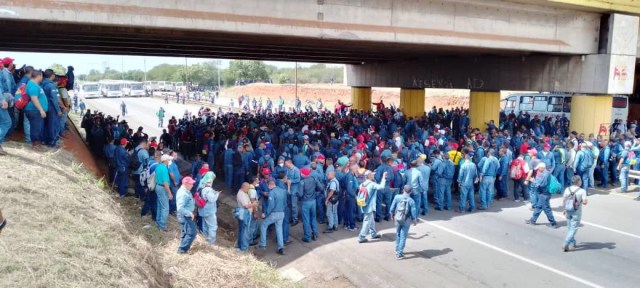
Sidor workers are asking for improved salaries as well as the reinstatement of health insurance and collective bargaining rights.
By Venezuelanalysis – Ricardo Vaz
Jan 14, 2023
Venezuelan industrial workers have staged demonstrations to demand higher wages at state-owned steelmaking company Siderúrgicas del Orinoco (Sidor).
Since last Monday, hundreds of Sidor workers have walked out from their posts in the large-scale industrial complex in Ciudad Guayana, Bolívar state. They have blocked the local highway every day and urged the company to address a number of labor issues.
“This is not a political protest,” spokesman Henry Quintana told local reporters. “This is a workers’ protest, and we will not back down until we are heard.” Other spokespeople stated that salaries should be set in US dollars to shield them from currency devaluation.
The Sidor rallies have reportedly drawn support from other companies in Venezuela’s industrial heartland. Apart from the living wage demands, the striking workers likewise want health insurance policies reinstated and a new collective contract.
“We are united in this struggle and waiting for a response to our demand for fair wages,” an anonymous worker told community media outlet Tatuy Tv. He stressed that the protesters are not guarimberos, a term associated with violent, right-wing anti-government demonstrations.
The grassroots collective additionally reported that different labor organizations in the region are considering a broader action to unify demands.
“There was tremendous inflation in December and our incomes were devalued,” worker José Martínez explained. “We want fair wages, we want our vacation bonuses and social benefits paid, as well as collective bargaining rights.”
The steelworkers have spent several months calling on the firm’s administrators to adjust salaries to rising living costs and staged a number of wildcat strikes. They also require measures to address allegedly unsafe working conditions and that the company settle unpaid Christmas bonuses.
On Friday, the government reportedly appointed a commission to set up a negotiating table with Sidor worker representatives. The team includes National Assembly deputy Rory Quiaragua, union leader José Gil and Bolívar governorship secretary Pedro Perales, as well as Bolívar state governor Ángel Marcano.
A first meeting was held on Friday evening and led to a number of preliminary agreements, including pledges that those involved in the protests would not be laid off and to secure the liberation of several workers detained by security forces during the week. The two parties likewise agreed to set up dialogue mechanisms to converge on issues such as wages and bonuses, while worker representatives agreed to lift their highway blockade.
Two days earlier, the firm’s board and local authorities had organized a counter-demonstration to defend the government’s policies in the sector.
While the company’s leadership has yet to publicly comment on the latest protests, Marcano urged workers not to let their requests “paralyze the industry.” He insinuated the presence of “other interests” behind the demonstrations.
“We call on everyone to guarantee safe transit,” Marcano said, in reference to the blocked highway. “The [Nicolás Maduro] government is willing to sit down and talk to the workers.”
With an area spanning 25,000 square meters, Sidor was nationalized by the Hugo Chávez government in 2008 and is under the umbrella of the state-owned Venezuelan Guayana Corporation (CVG) conglomerate.
A hotbed of trade union activity, Sidor had worker control experiments after nationalization before a state-led, top-down management model was imposed. The industry has also seen a number of mobilizations surrounding collective bargaining agreements.
Venezuela’s state-owned corporations were hard-hit by the economic crisis and US sanctions which led to a lack of spare parts, a diminished workforce due to migration and a reduced capacity to invest and perform maintenance.
Some industries ground to a near halt. A liberal turn in the Maduro government’s economic policy has raised fears of privatization while labor organizations have denounced instruments such as Memorandum 2792 that scrapped collective bargaining rights and flattened wage scales.
In the case of Sidor, the company experienced a slight recovery in 2022 with a reported production of 230,000 tons of steel. However, the output corresponded to just around 6 percent of the installed capacity.
The steelworkers’ protests in eastern Venezuela have coincided with a number of mobilizations from teachers and education workers in recent days with similar demands of fair wages and a new collective contract.
…
Read More: Venezuelanalysis – Venezuela: Metalworkers Block Highway, Protest for Better Pay
…

